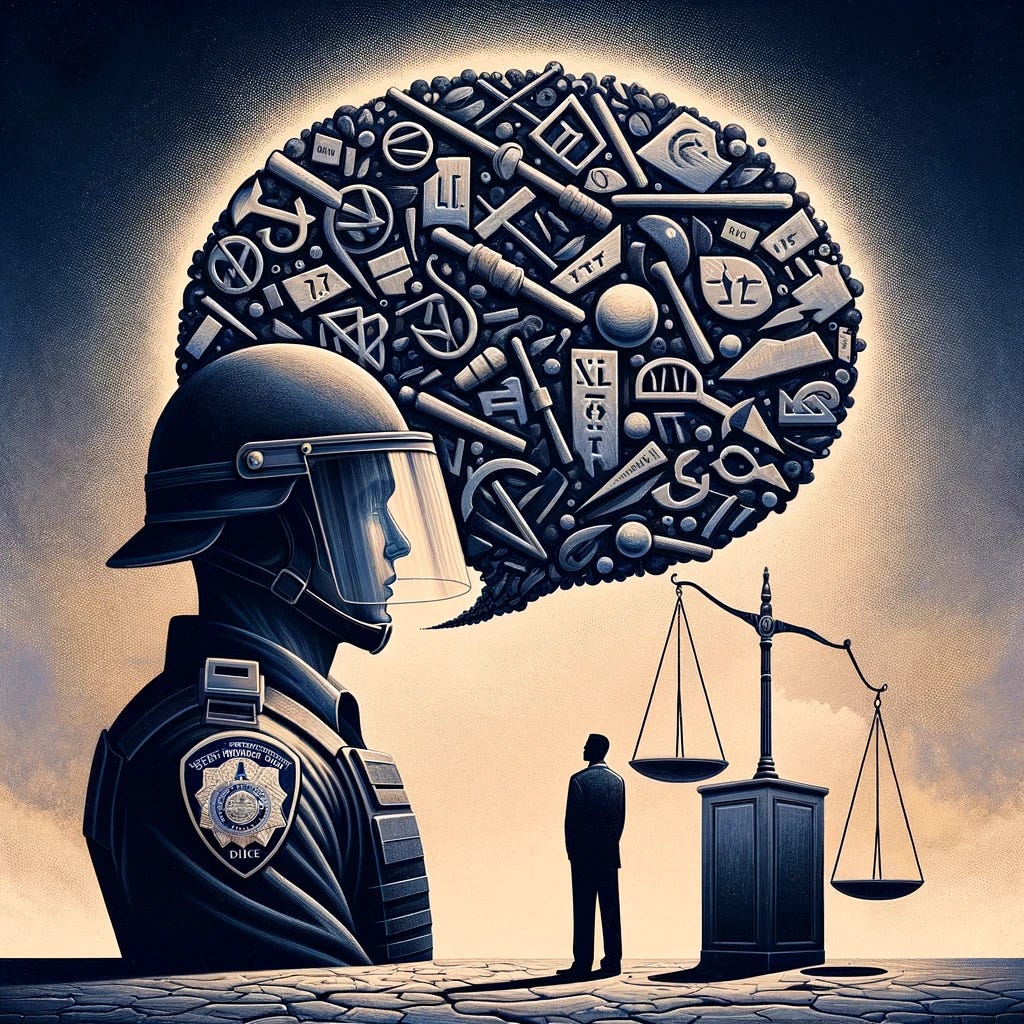F The Police!
Another look at the impact of profanity on perceptions
Publication
Adams, I. T. (2024). Fuck: The Police. Police Quarterly, 0(0). https://doi.org/10.1177/10986111241241750
What Was the Issue?
This paper expands upon the profanity work that we previously reviewed here. It provides a more nuanced look at the impact of the police use of profanity (specifically the F word) on law enforcement executives’ perceptions.
How Did He Look at It?
That author conducted a survey experiment with almost 1500 professionals. About ¾ of these were heads of law enforcement agencies and about ¼ were heads of human resources. There were two manipulated variables of interest. The first was the intent of the profanity. The intent was derogatory (e.g. insulting), positive (e.g. expressing admiration), or neutral (neither positive nor negative). The second was the target of the profanity. The target was self-directed (pointing at the officer), colleague-directed (targeted at another officer), or public-directed (meant for a member of the public). The intent and target were crossed to create 9 possible scenarios. Each participant evaluated 4 scenarios that were randomly chosen from the 9 situations. The evaluators were asked to evaluate if the profanity was acceptable, professional, and would impact public trust on 5 point scales (higher scores indicated more positive views). The participants also answered what sort of discipline would be appropriate based on their agency’s policy and their personal opinion about how severe the disciplinary action should be on five-point scales ranging from no sanction (1) to termination (5).
What Did He Find?
The overall analysis of the data was conducted using complex multi-level modeling, but the figure below provides a nice summary of the results. The overall patterns are consistent. Profanity targeted at the public was seen as less appropriate, less professional, and more damaging to public trust than self-directed profanity. Profanity directed at the public was also associated with more severe disciplinary sanctions. Intent made some difference if the profanity was directed at the public, but the profanity was always viewed more negatively than when self or colleague-directed. Derogatory profanity directed at a colleague was seen as more negative than self-directed derogatory profanity. It is also worth noting that the perceptions of appropriateness, professionalism, and public trust were all below the midpoints on the scales suggesting that the law enforcement executives generally frowned on the use of profanity regardless of target or intent.
So What?
This is the first paper to examine how police executives view profanity. Adams argues that the results show that language is complex and nuanced, and policy should take this into account. Policy should make distinctions for other vs. self-directed profanity and should also recognize the difference between derogatory, neutral, and positive uses of profanity. These suggestions make sense to me.
But for the line officers reading this blog, I want to emphasize that the results of this study show that police executives take a very negative view of profanity directed at the public regardless of the intent. The results also show that law enforcement executives take a dim view of derogatory profanity directed at other officers. The results also show that police executives take a negative view of profanity generally. These findings combined with previous research suggest that officers who use profanity are exposing themselves to risk. In a world where there are lots of risks that you can’t control, why take on a risk that you don’t have to?




The negative perception of profanity directed towards the public and negative administrative viewpoint is well documented. What effect does the use of profanity have on elevating stress levels for the individual in highly volatile situations? While most LEO’s are encouraged to use a “command voice” while controlling their emotions to gain compliance, there are those who seem to think that adding a profane adjective will make a subject more compliant. Does the individual screaming “Get out of the f***ing car” over and over think he/she will gain more compliance? Youtube is replete with videos of cops freaking out shouting obscenities at suspects demanding compliance, often with negative consequences. We talk about audio occlusion for those involved in stressful events. Maybe we need to consider audio occlusion for subjects being screamed at vs just being obstinate to obeying rational/lawful commands.
The response of the deputy sheriff who, rightly or wrongly, shot Sonya Massey is an example of emotionally going from zero to 10 (with profanity) resulting in negative consequences for both her and him. Was his use of profanity in response to a perceived threat a factor in his response? Did it indicate a loss of rational control under stress? I don’t know, but it would be interesting to study the rapidity and level of SNS response for those who appear to be more emotionally labile.
Emotionally going from zero to 10 in milliseconds to a SNS response can not only significantly impair rational judgment, it also affects the responses of others around you. An example of a highly stressed response leading to poor tactics and outcome was illustrated in a recent USCCA video (https://www.youtube.com/watch?v=ch9Z8TPCBZg ). Learn from the takeaways.